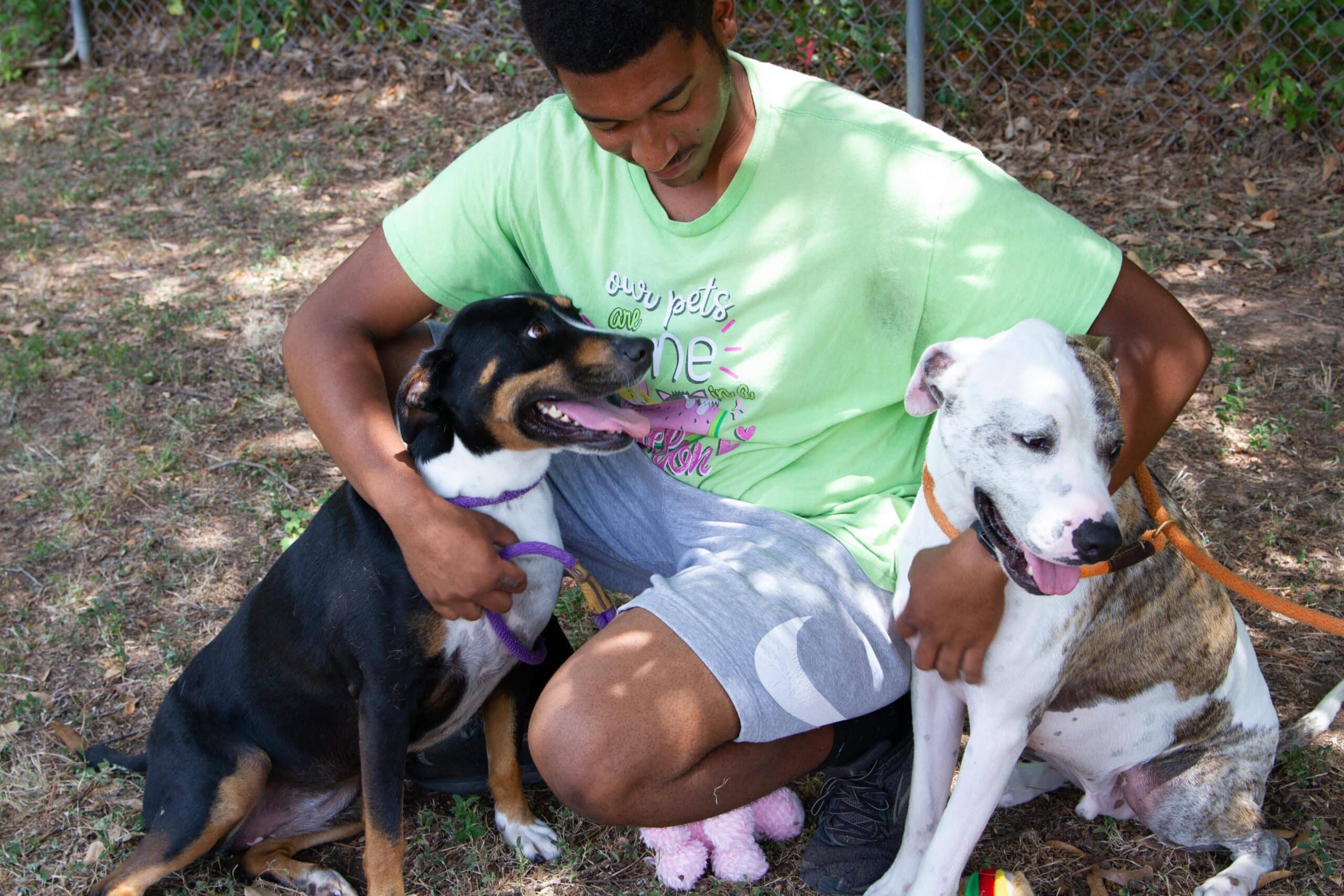
An SHSU professor’s personal animal rescue efforts grew into today’s local organization and animal shelter.
That ideology of doing whatever it takes to rescue fur babies from the streets and despairing situations is now being carried on by a dedicated board of directors, Rita B. Huff (RBH) Animal Shelter Director Lori Toliver, eight other staff members, and about 30 volunteers. “It is our responsibility to make these animals healthy and happy,” said Toliver. “Animals can’t speak for themselves, so they depend on humans to take care of them. Humans need to speak up and be their voice.”
Toliver has been the Rita B. Huff shelter director for five years and is no stranger to the world of service. A former Florida police officer, Toliver left that career and decided to spend her time helping animals. Before coming to Huntsville, she worked at the Bryan Animal Shelter and then as director of the Navasota Animal Shelter which, under her reign, went from a kill to a no-kill shelter. The Rita B. Huff Animal Shelter has been a no-kill shelter since 2016.
“I have dogs and horses myself and have always just loved animals. They have been an important part of my life,” says Toliver. “When I was a cop and working patrol, dispatch would always save the animal, elderly, and children cases for me–because they knew I would take care of them and get something done.”
The Rita B. Huff Humane Society of Walker County was organized in 1982 by a group of interested citizens, including its namesake, who was a professor and chairman of the Accounting Department at Sam Houston State University. Huff loved animals and used her ranch east of town as a personal animal shelter. She and others took in stray dogs, nursed them back to health, had them spayed and neutered, and found homes for them. Eventually, she and other concerned citizens decided it was time to open a regular animal shelter in town. Dr. Huff suffered a stroke and died days before the first formal meeting of the humane society, where plans for the shelter would begin. Soon after the society was incorporated and received its non-profit status, it was decided the shelter was to be named in Huff’s honor. After spending a few years fundraising, the land was donated by the Gibbs Brothers and construction began. The RBH Animal Shelter officially opened its doors on August 1, 1986.
Located at 530 Bearkat Blvd., the no-kill shelter houses dogs and cats who have been abandoned, hurt, left for dead, and/or surrendered. The condition animals arrive in varies from mange and skin allergy reactions to broken bones. While Toliver says they take as many animals as they can handle, there is a limit, and only so many kennels.
The shelter currently has 19 dog runs, two receiving areas, a surgery room, and limited room up front to keep puppies away from bigger dogs until they are fully vaccinated and have grown some.
‘When we are full, animals are put on a waiting list. We are very crowded and have an ongoing waiting list,” explains Toliver. “We take strays first, because they are on their own and have no help. Surrenders have someone to take care of them until we have room.”
The cost to adopt from the shelter is $85 for adult dogs; $100 for puppies; and $45 or 2/$60 for cats. When an animal is adopted out, it has been given all vaccinations, microchipped, spayed and/or neutered, wormed, and given flea medicine. While Toliver says they do try to host adoption events at least once a month and have adoptable cats at Petco in Huntsville, they are still always overflowing.
“For example, we just picked up a litter of puppies found by a work crew underneath the steps of an old church. The “church puppies” were dumped like yesterday’s trash and were only 2 pounds when we picked them up. One littermate had already died,” explained Toliver.
The RBH Shelter operates separately from the City of Huntsville and does not receive funds from the city. It is a tax-exempt 501 c(3) organization.
“It cost us about $4,500 a week to keep the RBH shelter open,” estimates Toliver. “There are your basic operations like lights, payroll, etc. but we also have vet bills like everyone else, medicine and feed costs for the animals, blankets, cleaning supplies, toys, kennels, fencing, etc. There is always some kind of need for our animals.”
Since the RBH shelter is a nonprofit, they rely heavily on donations, both monetary and supplies. Donations may be made through Facebook, their webpage rbhhumanesociety.org, or by becoming a monthly sponsor. Supplies are also needed, such as kitty litter, Purina One cat food and dog food, Kitten Chow for kittens, Pro Plan puppy food for puppies, towels, crates, bleach, paper towels, and dog toys–just to name a few. Toliver says volunteers are also welcome but must attend an orientation.
The shelter does receive about $12,000 annually from Walker County as the only rabies quarantine location for the county. They have two pens isolated for dogs that have been quarantined by the Walker County Sheriff’s Department for biting or scratching humans that results in bleeding.
There are also special fundraising events to help offset costs. Last year, the RBH Board hosted the “Pawtoberfest” fundraising event in Huntsville. The event included dinner and an auction (and some of the shelter dogs tagged along as well). The board decided to focus on the capital campaign for construction (which is ongoing) in lieu of Pawtoberfest for this year.
“We don’t set a specific goal,” said Toliver. “We are just grateful for what we can get.”
In an effort to help keep all Walker County animals healthy, the shelter offers several services.
Each Monday from 11 to noon, the shelter offers a low-cost vaccination clinic. This includes basic vaccinations, microchipping, deworming, heartworm testing, and other necessary services for dogs and cats. No appointments are necessary, and patients are seen in the order of arrival time.
The shelter also has a spay/neuter program to help control the growing stray and abandoned animal population.
“We are sinking in animals with no homes. We are losing the battle, because of the number of kittens and puppies bred by people who can’t take care of them or don’t realize all it takes to be a responsible pet owner, then can’t afford to take care of them properly,” said Lori. “I strongly encourage people to spay and neuter their animals. There are so many low-cost clinics that can do it now, but people don’t take advantage of them.”
The SNAP (Spay Neuter Assistance Program) is funded by the county. The reduced prices program is open to all eligible Walker County residents with a limit of two animals per month, per household. To be eligible, a proof of residency in Walker County must be provided, and animals must be current on their vaccinations. Surgeries are by appointment only.
With an older, crowded building and a two-page waiting list, the shelter has outgrown its current facility. “We outgrew this place 20 years ago,” said Toliver. “There is just so much need for these animals, more than ever before.”
The RBH Board of Directors has secured a location for a new shelter on Veterans Memorial Parkway. Ground has already been broken for a state-of-the-art shelter facility, boasting 5,600 square feet for intake, exam, and surgery rooms; and two separate buildings at 4,100 square feet each which will provide 60 indoor/outdoor kennels for dogs. There are also plans for a large exercise yard. While the project has begun, fundraising is ongoing, and additional funds are needed to complete and furnish the facility for operation.
“Dogs need to be able to feel the grass under their feet, have fresh air, have toys to play with, and know that people care about them,” said Toliver. “Shelters are stressful environments for animals. Imagine being stuck alone in a cage and on concrete all day; it’s like a prison. Some will shut down and don’t care about anything. They need the mental stimulation.”
Cats will be afforded their own unique space to explore, roam, and play.
The Rita B. Huff shelter has a program Toliver describes as a win-win. It is the “Second Chances” shelter dog program, in which shelter dogs are given a second chance in life with trusty inmates at the Ellis Unit. In this program, six dogs between the ages of eight months to five years enter a training program with the inmates. While there, the handlers train the dogs in basic obedience commands and work to help socialize them through interaction with other people and animals, which makes them more adoptable. The inmates who can participate are within two years of parole eligibility or completing their sentence.
Due to COVID-19, the program was temporarily suspended, and all dogs were brought back to the RBH animal shelter, which hopes to resume the partnership as soon as allowed.
Toliver, the RBH Board members, and RBH staff work hard each day to help the less fortunate animals of Walker County.
“My goal is to work myself out of a job to where there are no more stray animals and no unwanted puppies born,” says Toliver. “We’re like a safe haven for animals of Walker County,” sums up Toliver.
Rita B Huff Humane Society of Walker County
530 Bearkat Blvd
Huntsville, TX 77340
(936) 295-4666
rbhhumanesociety.org
facebook.com/RitaBHuffTX
Monday-Friday: 12pm – 6pm
Saturday: 12:00 – 4:00
Sunday: Closed

Postcards Magazine
936-293-1188
PO Box 690
Huntsville, TX 77342
